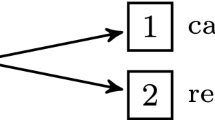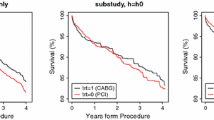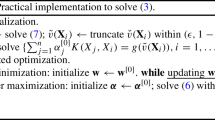Abstract
Propensity score is widely used to estimate treatment effects in observational studies. The covariate adjustment using propensity score is the most straightforward method in the literature of causal inference. In this article, we estimate the survival treatment effect with covariate adjustment using propensity score in the semiparametric accelerated failure time model. We establish the asymptotic properties of the proposed estimator by simultaneous estimating equations. We conduct simulation studies to evaluate the finite sample performance of the proposed method. A real data set from the German Breast Cancer Study Group is analyzed to illustrate the proposed method.
Similar content being viewed by others
References
Anderson, P. K., Gill, R. D.: Cox’s regression model for counting processes: a large sample study. Ann. Statist., 10, 1100–1120 (1982)
Austin, P. C.: An introduction to propensity score methods for reducing the effects of confounding in observational studies. Multivariate Behavioral Research, 46, 399–424 (2011)
Austin, P. C., Schuster, T.: The performance of different propensity score methods for estimating absolute effects of treatments on survival outcomes: A simulation study. Stat. Methods Med. Res., 25, 2214–2237 (2014)
Brown, B. M., Wang, Y. G.: Induced smoothing for rank regression with censored survival times. Stat. Med., 26, 828–836 (2007)
Chavez-Macgregor, M., Giordano, S. H.: Randomized clinical trials and observational studies: Is there a battle?. Journal of Clinical Oncology Official, 34, 772–773 (2016)
Cho, Y., Hu, C., Ghosh, D.: Covariate adjustment using propensity scores for dependent censoring problems in the accelerated failure time model. Stat. Med., 37, 390–404 (2018)
Cho, Y., Ghosh, D.: Covariate adjustment via propensity scores for recurrent events in the presence of dependent censoring. Communications in Statistics—Theory and Methods, 50, 216–236 (2021)
Gatzemeier, W.: Therapy of small breast cancer-four-year results of a prospective non-randomized study. German Breast Cancer Study Group (GBSG). Breast Cancer Research and Treatment, 34, 1–13 (1995)
Gayat, E., Resche-Rigon, M., Mary, J. Y., et al.: Propensity score applied to survival data analysis through proportional hazards models: a Monte Carlo study. Pharmaceutical Statistics, 11, 222–229 (2012)
Hade, E. M., Lu, B.: Bias associated with using the estimated propensity score as a regression covariate. Stat. Med., 33, 74–87 (2014)
Hernán, M., Rubin, J. M.: Causal Inference: What If, Chapman & Hall/CRC, Boca Raton, 2020
Imbens, G. W., Rubin, D. B.: Causal Inference for Statistics, Social, and Biomedical Sciences: An Introduction, Cambridge University Press, Cambridge, 2015
Johnson, L. M., Strawderman, R. L.: Induced smoothing for the semiparametric accelerated failure time model: asymptotics and extensions to clustered data. Biometrika, 96, 577–590 (2009)
Johnston, S. C., Rootenberg, J. D., Katrak, S., et al.: Effect of a US National Institutes of Health programme of clinical trials on public health and costs. Lancet, 367, 1319–1327 (2006)
Lai, T. L., Ying, Z.: Rank regression methods for left truncated and right-censored data. Ann. Statist., 19, 531–556 (1991)
Lu, B., Cai, D. J., Wang, L., et al.: Inference for proportional hazard model with propensity score. Communications in Statistics—Theory and Methods, 47, 2908–2918 (2018)
Lunceford, J., Davidian, M.: Stratification and weighting via the propensity score inestimation of causal treatment effects: a comparative study. Stat. Med., 23, 2937–2960 (2004)
Mao, H., Li, L., Yang, W., et al.: On the propensity score weighting analysis with survival outcome: Estimands, estimation, and inference. Stat. Med., 37, 3745–3763 (2018)
Pollard, D.: Empirical Processes: Theory and Applications, Institute of Mathematical Statistics, Hayward, 1990
Rosenbaum, P. R., Rubin, D. B.: The central role of the propensity score in observational studies for causal effects. Biometrika, 70, 41–55 (1983)
Silverman, S. L.: From randomized controlled trials to observational studies. The American Journal of Medicine, 122, 114–120 (2009)
Tsiatis, A. A.: Estimating regression parameters using linear rank tests for censored data. Ann. Statist., 18, 354–372 (1990)
Tsilidis, K. K., Kasimis, J. C., Lopez, D. S., et al.: Type 2 diabetes and cancer: umbrella review of meta-analyses of observational studies. BMJ, 350, g7607, 11 pp. (2014)
Vansteelandt, S., Daniel, R. M.: On regression adjustment for the propensity score. Stat. Med., 33, 4053–4072 (2014)
Ying, Z.: A large sample study of rank estimation for censored regression data. Ann. Statist., 21, 76–99 (1993)
Yu, J., Zhou, H., Cai, J.: Accelerated failure time model for data from outcome-dependent sampling. Lifetime Data Anal., 27, 15–37 (2021)
Zou, B. M., Zou, F., Shuster, J. J., et al.: On variance estimate for covariate adjustment by propensity score analysis. Stat. Med., 35, 3537–3548 (2016)
Acknowledgements
The authors are grateful for the valuable comments and suggestions from the editor, associate editor and two anonymous referees which drastically improved the article.
Author information
Authors and Affiliations
Corresponding author
Additional information
Supported by the National Natural Science Foundation of China (Grant Nos. 11501578 and 11701571) and the Fundamental Research Funds for the Central Universities (Grant No. 31512111206)
Rights and permissions
About this article
Cite this article
Cao, Y.X., Zhang, X.C. & Yu, J.C. Estimating Survival Treatment Effects with Covariate Adjustment Using Propensity Score. Acta. Math. Sin.-English Ser. 38, 2057–2068 (2022). https://doi.org/10.1007/s10114-022-0508-9
Received:
Revised:
Accepted:
Published:
Issue Date:
DOI: https://doi.org/10.1007/s10114-022-0508-9
Keywords
- Accelerated failure time model
- covariate adjustment
- observational study
- propensity score
- simultaneous estimating equations




